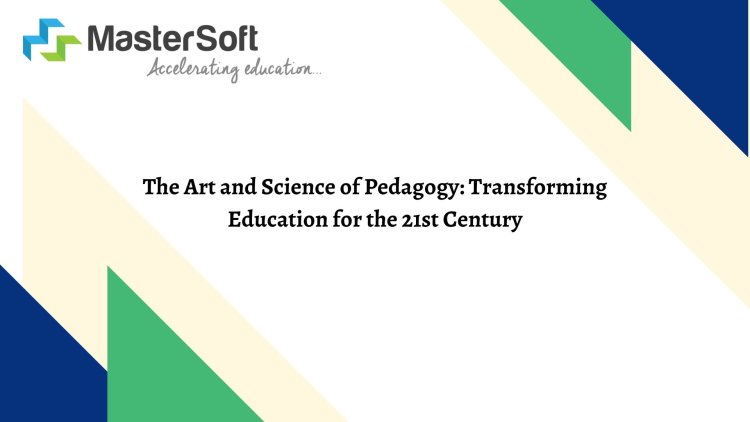The Art and Science of Pedagogy: Transforming Education for the 21st Century
Share this Post to earn Money ( Upto ₹100 per 1000 Views )

Education is the foundation of personal and societal development, shaping the minds of future generations. At the heart of education lies pedagogy, the method and practice of teaching. Pedagogy encompasses the strategies, techniques, and approaches used by educators to facilitate learning. In the 21st century, with rapid technological advancements and evolving societal needs, the concept of pedagogy has transformed, demanding innovative approaches to teaching and learning. This blog delves into the essence of pedagogy, its evolution, key pedagogical theories, modern trends, and the impact of effective pedagogical practices on education.
Understanding Pedagogy
Pedagogy, derived from the Greek words "pais" (child) and "agogos" (leader), literally means "leading a child." It refers to the art and science of teaching, encompassing a wide range of teaching methods and strategies that educators use to impart knowledge and skills. Effective pedagogy is crucial in creating an engaging, inclusive, and effective learning environment.
Evolution of Pedagogy
The evolution of pedagogy reflects changes in educational philosophies, societal needs, and technological advancements. Here’s a brief overview of how pedagogy has evolved over the centuries:
-
Classical Pedagogy:
- In ancient civilizations, education was primarily oral and focused on rhetoric, philosophy, and literature. Socratic questioning and dialogues were central to this approach.
- Example: Socrates’ method of questioning to stimulate critical thinking.
-
Medieval and Renaissance Pedagogy:
- Education became more formalized with the establishment of universities. The curriculum was based on the trivium (grammar, rhetoric, and logic) and quadrivium (arithmetic, geometry, music, and astronomy).
- Example: Scholasticism, which emphasized dialectical reasoning.
-
Modern Pedagogy:
- The Industrial Revolution brought about standardized education, focusing on reading, writing, and arithmetic. Pedagogical approaches became more structured and teacher-centered.
- Example: The factory model of education, characterized by rigid schedules and standardized testing.
-
Contemporary Pedagogy:
- The 21st century has seen a shift towards student-centered learning, incorporating technology, collaboration, and critical thinking.
- Example: Project-based learning, where students work on real-world projects and problems.
Key Pedagogical Theories
Several pedagogical theories have shaped modern education. Understanding these theories can help educators develop effective teaching strategies:
-
Behaviorism:
- Focuses on observable behaviors and the role of reinforcement in learning.
- Key Proponent: B.F. Skinner
- Example: Using positive reinforcement to encourage desired behaviors in the classroom.
-
Constructivism:
- Emphasizes the active role of learners in constructing their own knowledge based on experiences.
- Key Proponent: Jean Piaget
- Example: Inquiry-based learning, where students explore and investigate topics to build understanding.
-
Social Constructivism:
- Highlights the importance of social interactions and cultural context in learning.
- Key Proponent: Lev Vygotsky
- Example: Collaborative learning, where students work together to solve problems and learn from each other.
-
Cognitivism:
- Focuses on the mental processes involved in learning, such as perception, memory, and problem-solving.
- Key Proponent: Jerome Bruner
- Example: Scaffolding, where teachers provide temporary support to help students reach higher levels of understanding.
-
Humanism:
- Emphasizes the development of the whole person, including emotional and social aspects.
- Key Proponent: Carl Rogers
- Example: Student-centered learning, where students’ interests and needs guide the learning process.
Modern Trends in Pedagogy
As education continues to evolve, several modern trends are shaping the future of pedagogy:
-
Technology-Enhanced Learning:
- The integration of digital tools and resources into the learning process.
- Example: Using interactive whiteboards, online learning platforms, and virtual reality to enhance classroom instruction.
-
Personalized Learning:
- Tailoring education to meet the individual needs, interests, and learning styles of students.
- Example: Adaptive learning software that adjusts content and pace based on students’ performance.
-
Blended Learning:
- Combining traditional face-to-face instruction with online learning components.
- Example: Flipped classrooms, where students watch lectures online and engage in hands-on activities during class time.
-
Competency-Based Education:
- Students progress based on their ability to demonstrate mastery of specific skills and knowledge.
- Example: Allowing students to advance to more complex topics once they have mastered the foundational skills.
-
Social and Emotional Learning (SEL):
- Integrating the development of social and emotional skills into the curriculum.
- Example: Programs that teach empathy, self-regulation, and relationship-building skills.
Impact of Effective Pedagogy on Education
Effective pedagogy has a profound impact on student learning and overall educational outcomes:
-
Increased Engagement:
- When teaching methods are engaging and relevant, students are more likely to be motivated and actively participate in their learning.
-
Improved Learning Outcomes:
- Pedagogical approaches that cater to diverse learning styles and needs can lead to better understanding and retention of knowledge.
-
Enhanced Critical Thinking and Problem-Solving:
- Pedagogies that encourage inquiry, exploration, and collaboration help students develop higher-order thinking skills.
-
Greater Inclusivity:
- Inclusive pedagogical practices ensure that all students, regardless of their background or abilities, have equal opportunities to succeed.
-
Preparation for the Future:
- Modern pedagogies equip students with the skills and knowledge needed to thrive in a rapidly changing world, including digital literacy, collaboration, and adaptability.
Conclusion
Pedagogy, the art and science of teaching, is a dynamic and evolving field that plays a crucial role in shaping the future of education. By understanding and applying various pedagogical theories and embracing modern trends, educators can create engaging, inclusive, and effective learning environments that prepare students for the challenges and opportunities of the 21st century. As education continues to evolve, the importance of innovative and effective pedagogy will only grow, making it essential for educators to stay informed and adaptable in their teaching practices.

 deanjennyjohn
deanjennyjohn 





